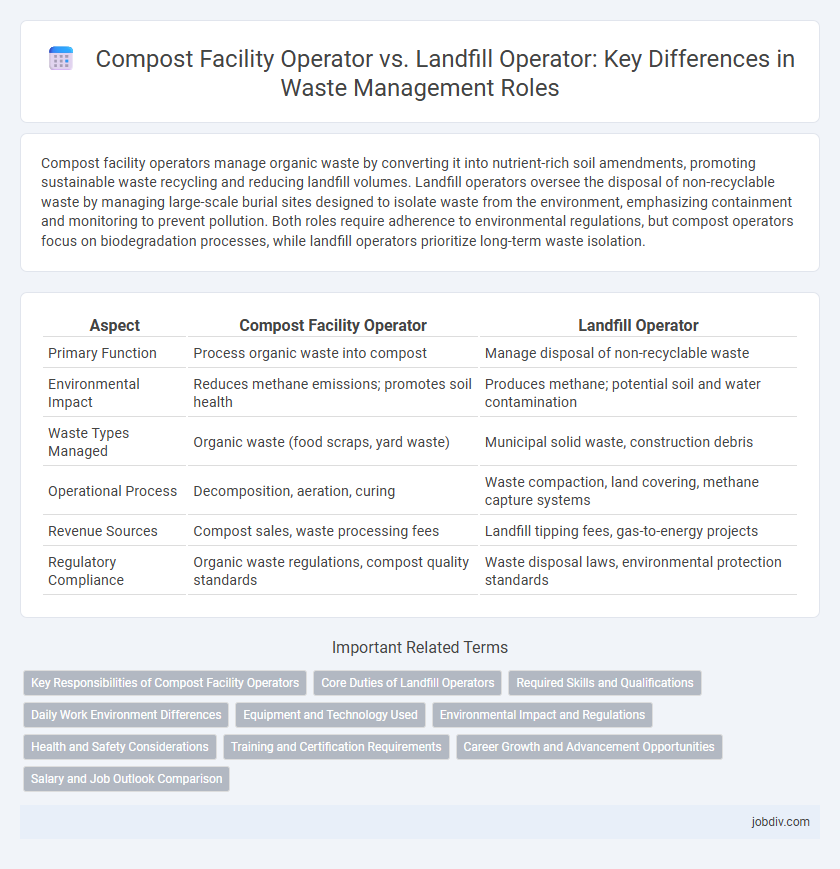Compost facility operators manage organic waste by converting it into nutrient-rich soil amendments, promoting sustainable waste recycling and reducing landfill volumes. Landfill operators oversee the disposal of non-recyclable waste by managing large-scale burial sites designed to isolate waste from the environment, emphasizing containment and monitoring to prevent pollution. Both roles require adherence to environmental regulations, but compost operators focus on biodegradation processes, while landfill operators prioritize long-term waste isolation.
Table of Comparison
| Aspect | Compost Facility Operator | Landfill Operator |
|---|---|---|
| Primary Function | Process organic waste into compost | Manage disposal of non-recyclable waste |
| Environmental Impact | Reduces methane emissions; promotes soil health | Produces methane; potential soil and water contamination |
| Waste Types Managed | Organic waste (food scraps, yard waste) | Municipal solid waste, construction debris |
| Operational Process | Decomposition, aeration, curing | Waste compaction, land covering, methane capture systems |
| Revenue Sources | Compost sales, waste processing fees | Landfill tipping fees, gas-to-energy projects |
| Regulatory Compliance | Organic waste regulations, compost quality standards | Waste disposal laws, environmental protection standards |
Key Responsibilities of Compost Facility Operators
Compost facility operators manage organic waste processing, overseeing the decomposition of biodegradable materials into nutrient-rich compost through controlled aerobic conditions. They monitor temperature, moisture, and aeration levels to optimize microbial activity, ensuring compliance with environmental regulations and maintaining odor control. Their responsibilities include managing feedstock intake, equipment operation, and quality testing of finished compost for safe agricultural use.
Core Duties of Landfill Operators
Landfill operators manage the daily operations of waste disposal sites, including the safe and efficient placement of refuse materials to minimize environmental impact. They monitor landfill gas emissions, control leachate, and ensure compliance with environmental regulations while maintaining site safety. Key responsibilities involve operating heavy machinery to compact waste and covering it with soil to reduce odors, pests, and fire hazards.
Required Skills and Qualifications
Compost facility operators require expertise in organic waste management, understanding of aerobic decomposition processes, and knowledge of soil science to produce nutrient-rich compost. Landfill operators must possess skills in heavy machinery operation, waste compaction techniques, and compliance with environmental regulations to manage solid waste containment effectively. Both roles demand proficiency in safety protocols and environmental monitoring to minimize ecological impact.
Daily Work Environment Differences
Compost facility operators work in environments characterized by organic matter decomposition, managing aerobic processes that generate heat and moisture, requiring consistent monitoring of temperature and oxygen levels. Landfill operators manage large waste containment areas with heavy machinery, exposure to landfill gases like methane, and strict adherence to leachate control and environmental regulations. While compost operators engage more in biological waste transformation, landfill operators focus on waste containment, site maintenance, and minimizing environmental impact from non-decomposable materials.
Equipment and Technology Used
Compost facility operators utilize aerobic digestion equipment such as aerated static piles, turners, and biofilters to accelerate organic matter decomposition and control odors. Landfill operators rely on heavy machinery like compactors, bulldozers, and gas collection systems to manage waste layering, compaction, and methane capture. Advanced sensor technology and automated monitoring systems are increasingly integrated into both operations to optimize efficiency and environmental compliance.
Environmental Impact and Regulations
Compost facility operators manage organic waste decomposition, significantly reducing methane emissions compared to landfill operators who handle mixed waste that emits high levels of greenhouse gases. Composting is regulated under the Resource Conservation and Recovery Act (RCRA) with strict guidelines on contamination control, while landfills comply with the Clean Air Act (CAA) and monitoring of leachate to prevent soil and water pollution. The environmental impact of composting centers on enhancing soil health and carbon sequestration, whereas landfill operations prioritize methane capture systems to mitigate climate change effects.
Health and Safety Considerations
Compost facility operators face health and safety risks such as exposure to bioaerosols, microorganisms, and organic dust, necessitating strict respiratory protection and hygiene protocols. Landfill operators are exposed to hazardous gases like methane, leachate, and potential heavy metal contaminants, requiring robust gas monitoring systems and protective equipment to prevent respiratory and chemical hazards. Both roles demand comprehensive training in waste handling, emergency response, and adherence to environmental regulations to minimize occupational health risks.
Training and Certification Requirements
Compost facility operators must complete specialized training in organic waste management, including understanding aerobic decomposition and contamination control, often requiring certifications such as the Compost Facility Operator Certification (CFOC). Landfill operators are typically required to obtain certification from environmental authorities like the Solid Waste Association of North America (SWANA), focusing on landfill design, gas management, and regulatory compliance. Both roles necessitate ongoing education to stay current with evolving environmental regulations and best practices in waste management.
Career Growth and Advancement Opportunities
Career growth for compost facility operators often includes roles in environmental management, sustainability consulting, and regulatory compliance, leveraging expertise in organic waste processing and soil health improvement. Landfill operators may advance into positions focused on environmental monitoring, waste diversion strategies, and landfill engineering, emphasizing compliance with environmental regulations and methane capture technologies. Both careers offer upward mobility, though compost facility roles increasingly align with green economy trends and circular waste management practices, enhancing long-term advancement potential.
Salary and Job Outlook Comparison
Compost facility operators typically earn an average annual salary ranging from $35,000 to $50,000, reflecting growing demand due to increased environmental regulations and waste reduction initiatives. Landfill operators have a similar salary range, often between $33,000 and $48,000, but face a steadier job outlook as landfill usage gradually declines with rising composting practices. The U.S. Bureau of Labor Statistics projects a 3% growth rate for compost facility operators over the next decade, outpacing the 1% growth expected for landfill operators because of the shift toward sustainable waste management.
Compost Facility Operator vs Landfill Operator Infographic

 jobdiv.com
jobdiv.com